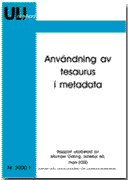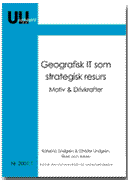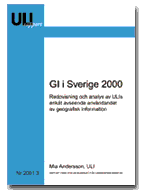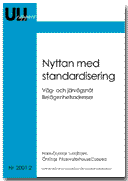Sammanfattning
 Denna rapport är en översikt om hur tesaurus och låsta värdelistor används i metadata. Det pågår/har genomförts flera parallella studier om struktur och innehåll för metadatabeskrivningar av geografiska data. T ex inom CEN och ISO. De innehåller ett växlande antal variabler (metadataelement) som skall ifyllas. Många av dessa element är begränsade till kontrollerade värdelistor för att inte synonymer för samma sak skall börja användas. Värdemängden för dessa kontrollerade listor är oftast definierade inom standarderna . Detta kan vara t ex beskrivningar av produktionsstatus och den fysiska utformning av datasetet.
Denna rapport är en översikt om hur tesaurus och låsta värdelistor används i metadata. Det pågår/har genomförts flera parallella studier om struktur och innehåll för metadatabeskrivningar av geografiska data. T ex inom CEN och ISO. De innehåller ett växlande antal variabler (metadataelement) som skall ifyllas. Många av dessa element är begränsade till kontrollerade värdelistor för att inte synonymer för samma sak skall börja användas. Värdemängden för dessa kontrollerade listor är oftast definierade inom standarderna . Detta kan vara t ex beskrivningar av produktionsstatus och den fysiska utformning av datasetet.
I de flesta standarder finns även möjlighet att ämnesmässigt beskriva datasetet. Både till vilket tillämpningsområde som datasetet är lämpligt att använda till (disciplin) och vilka objekttyper/attributtyper datasetet innehåller (parametrar). Dessa värdelistor brukar även kallas för nyckelord.
Discipliner är ofta ett relativt begränsat urval av ämnen ca 20 stycken, som övergripande grupperar dataset. Ett tesaurus innehåller ofta relativt omfattande nomenklatur för att beskriva den information som lagras i datasetet. Det finns ingen enhetlighet när det gäller användning av tesaurus. Val av tesaurus kommer helt att styras av tillämpningsområdet och det kan vara svårt att hitta ett generellt tesaurus som tillfredställer allas behov på samma sätt som metadatastandarderna idag är en kompromiss mellan olika tillämpningsområden och där specifika profiler av den generella standarden troligen att tas fram för t ex miljövård, demografi och geologi.
De metadatainitiativ som studerats i rapporten visar på en stor heterogenitet. Få utnyttjar gemensamma tesaurus. Ett större arbete GEMET (General Multilingual Environmental Thesurus) har dock genomförts med att skapa ett flerspråkligt tesaurus som bygger på flera skilda europeiska initiativ. Av de studerade exemplen är detta det mest kompletta som studerats. Med dokumenterade metoder och verktyg för förvaltning.
Författare: Michael Östling, Satellus AB
Pris exkl. moms: 100 kr
Beställ rapporten via e-post.


 Studies have shown that the use of geographic information systems (GIS) may generate a benefit/cost ratio in the range of 3-8. The results have been the more efficient use of resources for providing services in areas such as communications, rescue and emergency services, utilities and defence. Using digital map data in combination with new techniques can make major savings. For example, human resource requirements can be decreased and logistics may be improved.
Studies have shown that the use of geographic information systems (GIS) may generate a benefit/cost ratio in the range of 3-8. The results have been the more efficient use of resources for providing services in areas such as communications, rescue and emergency services, utilities and defence. Using digital map data in combination with new techniques can make major savings. For example, human resource requirements can be decreased and logistics may be improved. ULI, the Swedish Development Council for Land Information, carries out surveys about the use of geographic information systems (GIS) and geographic information (GI) in Sweden with a few years interval. The aim is to describe the use by identifying elements of success and problems as well as capturing wishes and changes. ULI has earlier accomplished four surveys about the use of GIS in Sweden. This report is consequently the fifth. The report answers questions about the use of geographic information within different organisations, the presence of IT-strategies, which systems are used and for what, how the use of GIS is distributed between different areas of practice, investments of digital geographic data and how organisations obtain digital reference data. The report also provides an indication of the users opinion concerning prices and quality of geographic information. The organisations have also answered questions about the need for education, research and development (R&D) as well as standards. The report also presents information concerning implementation and number of persons using GIS, as well as questions about elements of success and obstacles. Certain questions from the survey of 2000 has been compared with previous surveys. The number of people working with GIS daily has steady increased some 30% each year between 1995 and 2000. The most important elements of success are indicated as follows; the organisation management must be positive, data must be stored in bases which are accessible for the whole organisation and there must be a clear IT-strategy where GIS is a part. The biggest obstacles for a successfull GIS are the lack of the descision maker´s understanding, the lack of competence within the personnel and the cost of data. ULI wishes that the current report will be of use for ULI´s members and others in their planning of various activities within the field of GI and GIS.
ULI, the Swedish Development Council for Land Information, carries out surveys about the use of geographic information systems (GIS) and geographic information (GI) in Sweden with a few years interval. The aim is to describe the use by identifying elements of success and problems as well as capturing wishes and changes. ULI has earlier accomplished four surveys about the use of GIS in Sweden. This report is consequently the fifth. The report answers questions about the use of geographic information within different organisations, the presence of IT-strategies, which systems are used and for what, how the use of GIS is distributed between different areas of practice, investments of digital geographic data and how organisations obtain digital reference data. The report also provides an indication of the users opinion concerning prices and quality of geographic information. The organisations have also answered questions about the need for education, research and development (R&D) as well as standards. The report also presents information concerning implementation and number of persons using GIS, as well as questions about elements of success and obstacles. Certain questions from the survey of 2000 has been compared with previous surveys. The number of people working with GIS daily has steady increased some 30% each year between 1995 and 2000. The most important elements of success are indicated as follows; the organisation management must be positive, data must be stored in bases which are accessible for the whole organisation and there must be a clear IT-strategy where GIS is a part. The biggest obstacles for a successfull GIS are the lack of the descision maker´s understanding, the lack of competence within the personnel and the cost of data. ULI wishes that the current report will be of use for ULI´s members and others in their planning of various activities within the field of GI and GIS. The importance of using standards will grow in a society where information processing and exchange are continuously increasing.
The importance of using standards will grow in a society where information processing and exchange are continuously increasing.